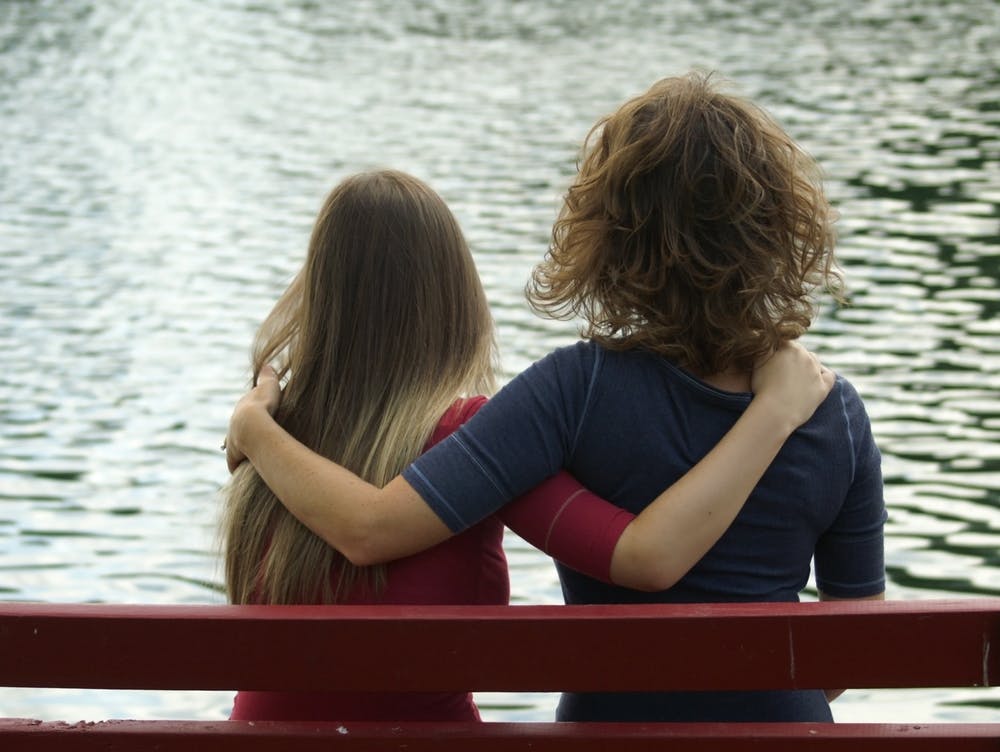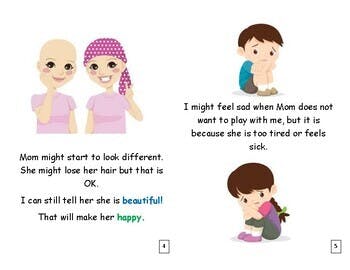Talking to younger children about cancer

Telling your children you have cancer is probably one of the most difficult things you'll ever have to do. Parents and carers often worry that telling the truth about their cancer will cause more distress for their children, but secrecy often makes things worse and only adds to a parent’s stress. Young children are incredibly intuitive and often know when things aren’t quite right for their caregivers.
Being open and honest with your children about what is happening is the best way to help them cope and adapt. It also shows them that you care for them and helps build resilience within the family.
Having conversations about cancer
Having the first conversation with your child/ren about cancer can feel overwhelming so being prepared and picking a safe moment are important. Here are some tips:
- Make sure you’re ready (or as ready as you can be). It may help to rehearse or write out what you want to say. Sit together somewhere comfortable and comforting to the child.
- Use simple language and avoid medical jargon. Think about the age/s of your children and make sure that they will understand what you are saying. Children as young as early primary school have often heard cancer spoken about before (for example, on TV), so using the word cancer is often very appropriate and reduces confusion with other types of illness they have experienced or witnessed. Adding that cancer isn’t contagious, ie ‘you can’t catch cancer’, is key (as opposed to a cold).
- Keep the information factual and brief. They will ask more questions until they are satisfied they have enough information. Following up with shorter conversations, where you can check what they understand, is often better that a very long initial conversation
- Build on what’s worked for you in the past when you’ve handled bad news or talked about difficult topics (ie. the death of a pet, a separation, about the impact of COVID-19).
- Use questions to get a sense of their understanding. For example, “The doctors have told me I have cancer. What do you know about cancer?” This will help you adjust your explanations to their level and correct any misunderstandings.
The key things to share with your child are: - The type of cancer you have (in simple language – referring to a body part is often enough, ie brain cancer, or skin cancer)
- The treatment(s) you will have, and how long it will take (breaking this down as much as you can: eg “I need to go to the hospital twice a week to have a strong medicine, called chemotherapy or chemo.”
- The side effects you might experience such as weight changes, tiredness, hair loss and the other ways cancer might affect you, such as not being able to work
- How your cancer is going to affect them and your family life, for example changes to routines, who will be in the home, who will take them to preschool or school etc.
- Assure them that you and your support network will do your best to limit the impact on their routines. Children thrive in environments which are as predictable as possible so although things may change rapidly day-to-day, communicating with them what is happening at the beginning of each day can help them prepare and adjust.
- Reassure them that although you may not be able to be with them as often as you would usually, that you are still with them. The book “The Invisible String” by Patrice Karst may help in explaining your connection to them, even when apart.
- Let them know that you will keep talking to them and will keep sharing with them
- Remind them that your cancer has nothing to do with anything they did, said or thought – that they didn’t ‘cause’ it (a common fear with young children)
- Sometimes highlighting who they can talk to about this is helpful (ie other trusted adults such as specific family members, school teachers/counsellors)
- Acknowledge and name their feelings while providing comfort and supporting them to express, notice and manage them in safe ways. Exploring different emotions though books can be useful – eg for younger readers “My Many Coloured Days” by Dr Suess, or the “When I’m Feeling…” series by Trace Moroney; or for slightly older children, the movie “Inside Out”
Creative ideas for talking to your children about cancer
Young children process their life experiences through play and creativity. You may help your child to understand what is happening by creating opportunities for your cancer to be explored in play:
- Use teddies, dolls and other toys to roleplay trips to the hospital, the changes to homelife and your treatment
- Create a ‘social story’ using family photos and pictures which describes your cancer, treatment and impact on your health and family routines. Children often lean into repetition, so having something to read over-and-over may help them feel comfortable with this new information. It may look something like this:

- Support your child to share what is happening for them and their family with their friends. Speak with teachers and others in their support network so they can understand and help. They may even like to share with their class about your diagnosis and treatment to show what they have learnt and what is happening in their world.
- Read stories that relate to the cancer experience. Some you may like are: Cancer Hates Kisses- Jessica Sliwerski, Our Dad is Getting Better - Alex Silver, Butterfly Kisses and Wishes on Wings - Ellen McVicker.
- Leave special notes, messages and pictures in their lunch box or around the house when you are apart to remind them that you love them and are thinking of them.
- Some children express their thoughts and feelings through art. You could use paint, playdough, pencils or crayons to show what is happening and encourage your child to describe how they are feeling about it. This is a nice opportunity for them to ask questions they may have while doing something nice together.
- Depending on your circumstances, it may help to watch this playschool episode about ‘beginnings and endings’.
Extra support
Even if you’re as prepared as you can be, talking to your children about cancer will most likely still be incredibly tough for you. The Parenting through Cancer community is here to support you. You can connect with other parents in similar situations or talk to a specially trained counsellor online (click on ‘Talk to a Counsellor’) or by calling 1800 945 215.
For more information about Camp Quality services, go to campquality.org.au or download a digital brochure.
